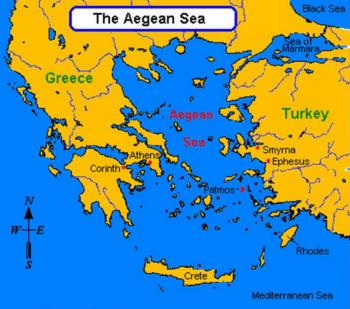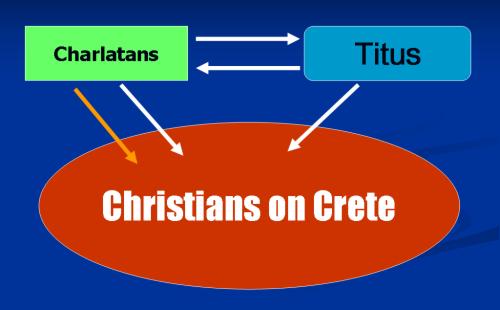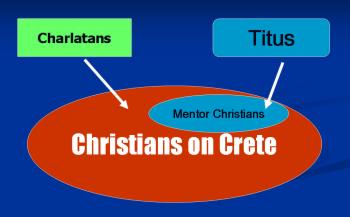PORTRAIT OF A NATION
 Click here to listen to this sermon.
Click here to listen to this sermon.
Take a look at a nation that is decaying.
- Its people are consumed with wealth and they will use every means legal and illegal to acquire. Call it greed or call it stealing, it works the same.
- Relationships have very little meaning. Adultery and infidelity are taken for granted. Homosexuality, casual sex and perversion are highly regarded. Children are not considered a blessing, but a financial liability or asset.
- Substance abuse is wide spread and overt; values of decency are in sharp decline
- Most offenses are not dealt with in the name of justice, but in the name of financial compensation.
- Honesty is a rare commodity and ones creativity at bending the truth is applauded.
Before you assume that this portrait of a nation is our USA, let me inform you that I am in fact talking about civilization on the island of Crete over 2000 years ago. But the similarities are stunning yes? Unfortunately the Crete of 2000 years ago parallels our society today:

- The courts of law were not interested in justice, but in financial compensation. For instance, a crime as serious as rape did not incur punishment, but a fine. On Crete, mothers could choose to leave their children to die, but only if the father did not want the child. And when a mother killed an infant without the fathers consent, she was charged a hefty fine.
- The rest of the world regarded Cretans as reprobates, dishonest, and uncultured. Today we have the ugly American, then they had the ugly Cretan.
Crete had become well known as a degenerate nation by the time of Christ:
- The people of Crete were well known as liars and reprobates. A common expression about lying in that day was to out Cretan a Cretan.
- Cretes major industry was piracy. The northern shore of Crete was a haven for pirate bands that terrorized the Mediterranean. The pirates of Crete were the most feared in the second century BC. Even after the Romans made Crete a province in 67 BC piracy continued on Crete.
But Crete had not always been such a despicable place. The earlier period of Cretan history (3000 1500 years BC) was a shining, golden age. The Minoan civilization rivaled the culture of Ancient Egypt. It was the basis of the legend of Atlantis. Five hundred years BC, Cretan law was recognized as strict, but fair. In fact, the Law Code of Gortyn is recognized today as unique, because the burden to make a case is on the one bringing charges.
A once great nation, now sick and decaying. Perhaps in examining Crete we do not look at the past, as much as we see our own possible future as a nation. We have a tendency to believe that things are worse than they ever have been. I do not at all wish to paint a rosy picture of our society today. There are serious problems and obvious moral decay. But let us not be naïve and think that this has never happened before. In fact, knowing that times past have been worse may help us. For instance, we wonder how we will ever influence our society for good with the gospel, well consider this: How do you preach and teach the gospel on Crete?
The message of the risen Messiah took shape within the context of the community of Israel. Israel is a highly moral community. In fact, their high morality often leads them to become arrogant, prudish, and self-righteous.
But now, some 20 to thirty years after the resurrection of the Messiah, we find a missionary, a Christian gentile named Titus entrusted with the task of sharing the gospel among pirates, thieves, perverts, drunks and liars. How? How do you do this?
Mission To Crete
|
Titus remained on Crete to complete unfinished work; this included appointing elders (1:5)
|
Titus is distracted by Cretan charlatans who are using Christianity as a profit-making scheme (1:10-16)
|
Paul urged Titus not to get involved in stupid controversies with the charlatans (3:9-10)
|
Rather, devote his energy to nurturing spiritual growth and holiness to form people eager to do good (2:14, 3:8)
|
Titus Mistake:
- Facing the opponents on their own turf
- Arguing their warped teaching on their terms. Dont get bogged down in their senseless and useless arguments. (Avoid foolish controversies 3:8)
- The opponents, who care very little about healthy teaching, will adapt and thrive. They aim to keep as many followers as possible and gain a profit
- Here is a lesson for the church: We have spent too much time fighting shadows and too little time calling people to grace.
- As a teen I was not impressed by the reasons that preachers gave for certain music being wrong. I knew all those reasons and I even knew more reasons. What impressed me were people, who appreciated good music and godly things even more than I appreciated the things I did.
-
How?
• Transformation, not just information
Leaders that Teach us How to Live
• Community of Faith Loving Relationships
• Generation to Generation Living Curriculum
|
The best way to muzzle or silence those who are upsetting entire households is not to argue or attack, but to teach things that are excellent and profitable for everyone. (Titus 2:11; 3:8)

Pauls Strategy:
- Take care of what remains, and 2) appoint elders in every city (Titus 1:5)
- Appointing elders is entrusting those who can lead others
- Taking care of what remains: Right Belief and Right Behavior
Belief = Grace and Gospel; Behavior = Holiness
- Healthy teaching produces holiness (Both are important)
- "To think is easy. To act is hard. But the hardest thing in the world is to act in accordance with your thinking." - Goethe


Healthy Teaching
- Two warnings to stop, then disassociate with them (3:10)
- Focus on the healthy teaching (2:1)
- Build up mentors (2:2-6)
- Model it (2:7)
- Doing Good (3:8)
- Rejecting ungodliness (2:12-13)
- Serving and maturing (3:14)
|
How do you share the gospel in America?
- This is not your fathers America. Lets accept that.
- We have a choice: 1) We can continue to lament, we can criticize and argue among ourselves, or 2) we can live a gospeled life and encourage others to do the same. (Illus: My great-grandfather argued with the TV I know his excuse, Whats our excuse?)
- Bob Briner, Roaring Lambs
- Go into your office or place of business and ask how many of your colleagues understand the doctrine of inerrancy or know what the apostle Paul meant with the word kephale or [when the rapture will occur]?(p. 29)
- The best way to stop the spread of evil is to replace it with something good. (p. 39)
- Its fine to rebuke whats wrong to drive out the bad spirit, but who will offer the good spirit in its place? (Luke 11:24) (Hollywood is not just corrupt because immoral people went to Hollywood, it is corrupt is because we spent our time arguing with those who did not care and we neglected/discouraged creative people who could have stepped in and made a difference.)
Whether it is Hollywood or Houston, LA or LJ, Federal government or family we need to follow Pauls advice to Titus: Our people must learn to devote themselves to doing what is good, in order that they may provide for daily necessities and not live unproductive lives. (3:14)
Chris Benjamin
West-Ark Church of Christ, Fort Smith, AR
Evening Sermon, 19 October 2008
 Link to next sermon
Link to next sermon
 Link to other sermons of Chris Benjamin
Link to other sermons of Chris Benjamin




 Link to next sermon
Link to next sermon
 Link to other sermons of Chris Benjamin
Link to other sermons of Chris Benjamin